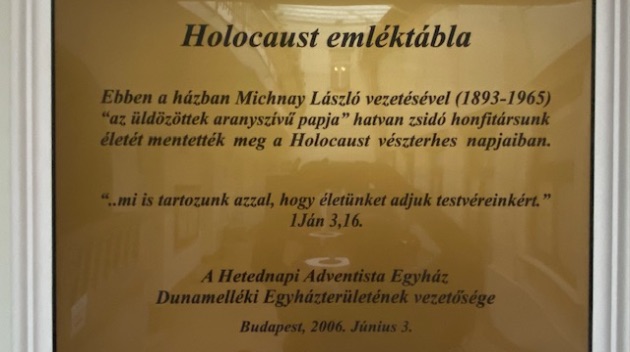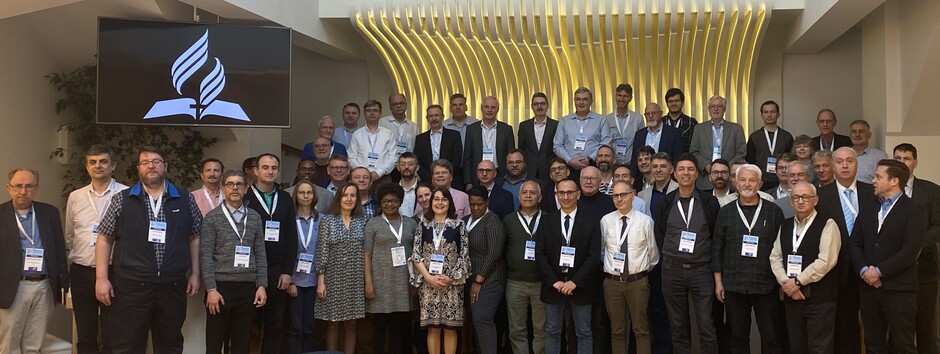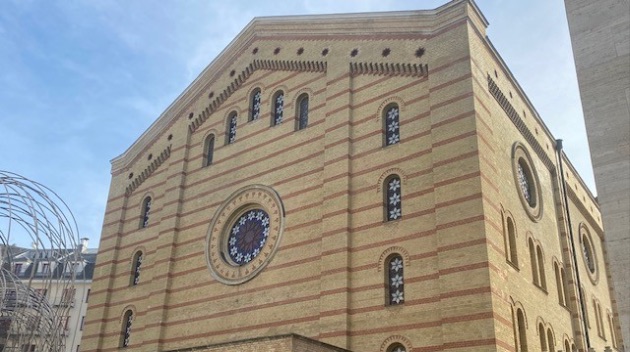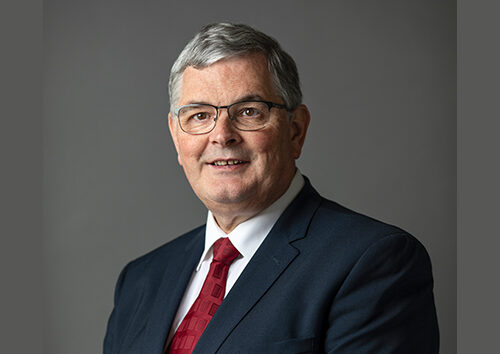26 March | Budapest, Hungary [David Neal]
When theology teachers from all European SDA seminaries, colleges and universities (ESD, EUD and TED) began to meet together professionally for the first time in the early 1990’s, the purpose was to connect, engage and dialogue with each other in ways not previously experienced. As teachers from Western Europe encountered colleagues from Eastern Europe, “The climate in the meetings was cautious, each institution trying to sus out the others,” reflected Mike Pearson organiser of the 1996 meeting at Newbold College. But with fellow host Laurence Turner, they were determined to ensure that the “European Theology Teachers Convention (ETTC) did not become a dry theoretical affair”, with scholarship on show, but to “be experiential and perhaps be a bit of a model for the other European colleges who were not able to participate in such meetings before.” Those early ETTC meetings were relatively small in number, but as Pearson notes, “It was fairly collegial and good for us all to see a wider Adventist world beyond our own campuses.”
Fast forward to 2023 and the 16th biannual ETTC held in Budapest, Hungary with 88 participants from 4 continents and 17 different countries. (Sadly, representatives from Zaoksky Adventist University [Russia] and Ukrainian Adventist Centre of Higher Education in Bucha, Ukraine were not able to participate this year.) With the meeting held 22-26 March at the Budapest Central church, the venue itself was significant to the convention theme, Tensions, Conflicts, Wars: ‘Storms’ in the Bible, Church & Society, for during the Second World War, the church leaders hid 50 Jews in the church basement to save them from death. (1).

A small group was tasked with preparing the programme and coordination of the event. Both the rector of the Hungarian Adventist Theological College, Tibor Tonhaizer, Union president Tamas Ocsai and Imre Tokics as the chair of the Organising Committee, welcomed the teachers to a time of discovery, fellowship, and spirit-filled conversation. As the author Mark A. Noll suggests reflecting on career of the 19th century theologian and preacher Jonathan Edwards, “It is not simply advantages to love the Lord with the mind; it is also good, sweet, holy, beautiful, and honouring to God.” (2) The teachers met in this spirit.
Dr Tihomir Lazic, president of the European Adventist Society for Theology and Religion Studies, in his welcome, emphasised the importance of fostering boldness, courage, and open-mindedness in theological scholarship and teaching. “By embracing a balanced, biblically informed, theologically sound, open-minded, and courageous scholarship, we can demonstrate the importance of critical and constructive engagement with the world around us—paving the way for future questions and countless kingdom possibilities.”
The purpose of the convention theme was to recognise a reality of ‘storms’ in contemporary life, leading the theologians to use scripture and history to address and try to understand the current dynamic – whether in the church or society.
Adventist Theology: a shared responsibility of theologians and administrators
The opening keynote address by Dr Reinder Bruinsma (Retired church administrator, scholar and author from the Netherlands) came with a plea for “theology not to be the exclusive domain of professionals, but a concern of all believers.” Quoting Anslem of Canterbury (ca. 1033-1109) the study of theology is “Faith seeking understanding”, meaning “I do not seek to understand in order that I may believe, but rather, I believe in order that I may understand”. As Bruinsma noted, this applies to every believer—including every Adventist Christian who searches for truth. “Necessary”, he continued, because it is “theology which deepens our faith, brings personal and social transformation, and facilitates our spiritual journey.”
Taking his listeners on a journey through Adventist theological thought from the 19th century to the present, Bruinsma emphasised that “the theological project is never finished but is always work in progress. The well-known Adventist expression ‘present truth’ rests on the conviction that theological reflection has a dynamic quality.”
“So, it may at times be necessary to reject earlier theological positions,” he added citing Ellen White: ‘Long-cherished opinion must not be regarded as infallible.’ But as Fritz Guy said, ‘new truth does not discard old truth, but incorporates it into a more complete and adequate understanding…’ Without a link to the past, ‘the new’ has neither credibility nor meaning.”
Resolving Conflict and Dissent
Recognising that at times, Adventist theologians and administrators work in tension with each other, Bruinsma believes that “fear is a major element” creating the tension. Administrators “see it as their responsibility to protect the theological heritage of Adventism”, but ‘present truth’ and theological reflection on it, by its very nature is dynamic. He called for both groups to find ways to turn fear into trust, for “both to work closer together, to actively listen to the perspective of the other, for the sake of ‘doing’ theology together in community.”

Contemporary Challenges to Seventh-day Adventist Theology
Dr Frank Hasel (Associate Director of the Biblical Research Institute) shared what he described as a personal perspective relating to some deeply rooted important challenges in the Adventist theological discourse. He acknowledged that because they “are the most difficult to talk about” we do not take the time to think through thoroughly.”
Truth – Stranger Than it Used to Be?
Approaching his presentation as “an invitation to start a conversation”, his foundational point was to raise the issue of truth. “How can we discern truth from fake truth? In pre-modern times there was an assumption that truth does exist, can be known, explored, found, understood and that which the bible can explain.” In contrast, in the “modern era we have to discuss and grapple with what truth is.” When we come to the post-modern era, we face the “dilemma of everybody having to find the truth that fits and suits themselves.” The result Hasel noted, is that there is “no contention for striving over truth” and “teaching doctrine becomes impossible with such thinking.” This in his mind leaves two distinct questions to consider, “Is there still divinely revealed truth we can rely on? Is the bible to be interpreted as any other book?”
As Hasel moved further into his presentation, he cited practical applications of the consequences the new paradigm, believing “such reductive approaches leading to a different kind of Adventist and creates multiple standards of what it means to be an Adventist.” For example, “while we want new believers to live a vibrant spiritual life, we see a legalism that is perceivable that is apparent around the world,” with “many of our members having no assurance of salvation”, but who have instead been caught up in a “Last Generation, performance driven theology.”
On the matter of biblical hermeneutics, he recognized “the diversity of understandings, which has been responsible for a wide variety of interpretations for issues,” which leaves us “talking past each other,” because, “there is no longer any unity over scripture. How can we therefore distinguish truth from error/right or wrong in such a climate?” And again Hasel admitted a reality which all gathered in the room knew, “We’ve never dealt with these issues.”
Moving on as to how society communicates online, Hasel shared some much-needed key characteristics about the ethics of communication in a digital age with 7 salient principles.
- Carefulness
- Fairmindedness
- Accuracy
- Truthfulness
- Humility
- Civility
- Responsibility
For a more detailed explanation of these principles you may enjoy reading Ethics of Communication in a Digital Age
Fellow Associate Director of the Biblical Research Institute, Alberto R. Timm concured with Hasel’s view that there is a ‘diversity of understandings’ on some theological matters, and “strongly believes in the importance of conferences like this for the purpose of dialogue. “It was so delightful to meet several friends. At the same to you see different perspectives, different views, for we cannot close our eyes and say that we are all on the same page. The trends are there which show that we are not all on the same page – that’s not the case and we have to be realistic.”

“Our conference title seems timely. There’s a lot of fear in the air these days.”

Among the notable lectures, for me as an ETTC observer, two stand out for their both their originality and relevance. The first was given by Kendra Haloviak Valentine (professor of New Testament, La Sierra University, USA) who opened her presentation with two brief sobering sentences which set the direction of her devotional talk from the gospel of Mark. “Our conference title seems timely. There’s a lot of fear in the air these days.” The opening line delivered in a slow and deliberate manner, was enough to capture the attention.
Citing examples, Holoviak Valentine set the contemporary scene: “cyberattacks, climate change, undocumented immigrants, super-viruses, terrorism, and chemical disasters. These on top of the typical other things that people fear: the fear of failure, abandonment, and a scary diagnosis. Fear is in the air. With storms in our church and society come fears.” Could the scene Mark portrays help us navigate contemporary storms?
To hear an audio version of Holoviak Valentine’s devotional in full “Take heart – I am! Do not be afraid” click here.
Storms in the Book of Judges: The Fate of Women in the Times of the Judges
The second was given by Danielle Gelbrich (Vice dean, Collonges Adventist University) with her lecture “Storms in the Book of Judges: The Fate of Women in the Times of the Judges.”
“If there is a book that bites and stings us, that is like a blow to the skull, it is the book of judges,” she explained. “With its ambivalent and often brutal stories, it pictures what must have been a rather dark period in the history of Israel. Quoting the commentator Daniel I. Block, Gelbrich noted that through “adopting the customs of Canaan, Israel becomes Canaanite. Instead of israelizing the Canaanites, the Israelites are canaanized by the Canaanites.”

Gelbrich’s narrative on the treatment of women in the times of Judges is a perhaps for many a new perspective. But it is real. Concluding by challenging today’s Adventist community to “do better than in the book of Judges”, Gelbrich invited us to imagine:
“Imagine if the Adventist community.
put their deep-seated conviction, that every human being is created in the image of God, into active practice and thus shared with the world the good news that nobody must be mistreated, excluded or despised. Not even women.
Imagine if the Adventist community.
lived a counterculture in our day – putting into active practise the values of the Kingdom of God where every human being has their place and is of inestimable worth, and at whatever cost to themselves, with a love and maturity grow in Christ.
Imagine if the Adventist community.
created an awareness of belonging to Yahweh, implying a way of life where love, justice and freedom can flourish, where Yahweh, the restorer of human dignity par excellence, is the ultimate reference. Under his protective wings, women and men can work together reconciled, expanding the Kingdom of God, uniting their talents and wisdom.
You may say I am a dreamer.
(An audio file will soon be available on which to listen to Gelbrich’s presentation).
The Teacher’s Perspective
Associated Professor of Biblical Studies in the School of Theology at Friednesau University, Dr Daniel Olariu “Very much appreciated meeting and catching up with friends” and with added emphasis noted “The social aspect of this event as much as the intellectual cannot be underestimated.” Olariu’s approach to the devotional time during ETTC was “What has God to say to me today?”, and he felt uplifted by the deeply spiritual content of the devotionals.
Olariu’s perspective on what it’s like being an Adventist theology teacher is informative. “It’s not always easy because the generations are changing”, he observed. “As I grow older, and the students seem to be getting younger and younger with a different mindset, I know that I need to take time to update myself in order to connect with their needs.” And the best way to catch up with students, Olariu believes, “is to mingle with them. Otherwise, if the theology teacher only emphasises the intellectual side, he/she will not be as effective. I think it is fair to say that they seem to appreciate the relationship with the teacher more than the teacher can at times give them. It’s as if that in order to fully absorb what you share, they need the context of relationship.”
But returning to the intellectual atmosphere of ETTC, Olariu notices a clear trend. “There is a shift to a greater humility among in Adventist scholars, recognising that more research should be done to settle many issues.” He also believes that the era of simple, superficial and expedient answers has gone, with the ChatGPT generation demanding more from theologians.
Martin Turcan (a lawyer teaching Ethics & Systematic Theology, Adventist Theological Institute, Czecho-Slovakian Union), saw this conference as a conversation, “an opportunity to get to see people from around Europe. I like it when theologians get together. We talk and discuss together with respect, in a tactful and courteous intellectual style without the turmoil of arguments. There is a spirit of generosity, in the room. I also like it when we open our theological discussion to folk from other denominations.”
Other impressions shared by teachers included comments that this conference as providing more thought-provoking papers than for previous conferences. Mentioned more than once in conversations and over the meal table was the question, “How do we live together?” A paper presented by Gil Valentine about keeping things to yourself when you are not sure resonated with many participants, reminding them of the words of Christ. “I still have many things to say to you, but you cannot bear them now.” (John 16:12 ESV)
The ETTC Take-Away
As the teachers returned to their respective colleges… their host Imre Tokics reflected, “I have been blessed by the convention atmosphere, by the high level quality of the lectures and the quality of the questions.” As Tihomir Lazic reflected he noted, “From the lively conversations and group discussions I witnessed, especially on Sabbath afternoon, it appears that European teachers found the conference immensely valuable for forging connections with fellow educators and scholars, while breaking down silos that some may face in local institutions due to a limited number of conversational partners within their theological discipline.”
And as a final thought he commented, “It is my hope that ETTC 2023 inspired excellence in both teaching and scholarship, highlighting the need for educators to empower their students by showing them the value of asking tough questions, embracing the unknown, living with tensions and mysteries, and confronting challenges with courage and boldness. As theological educators unite and learn from one another, they can better navigate the ‘storms’ facing society and work towards building a brighter future.”
tedNEWS will bring further reports, perspective and further audio files of presentations in the near future. Keep visiting ted.adventist.org to find more from the Budapest convention.
- The story is told of when the police visited the church to determine if Jews were hiding there. They were greeted by the pastor who was asked if he was hiding any Jewish people (because they knew he could not lie). The pastor knew that if he said ‘yes’, the police would arrest the Jews and take them away to a certain death. Nor could he say ‘no’, because he did not want to lie, and so invited them in to take a look for themselves. Feeling he had nothing to hide, they left and did not check the building.
- Mark A. Noll, The Scandal of the Evangelical Mind, p.80.
[Photos: David Neal and Shutterstock]



